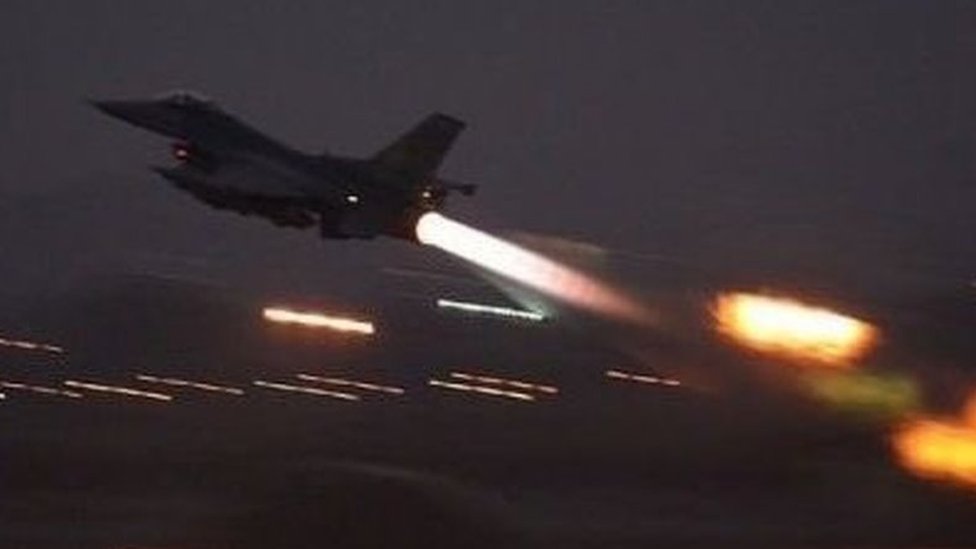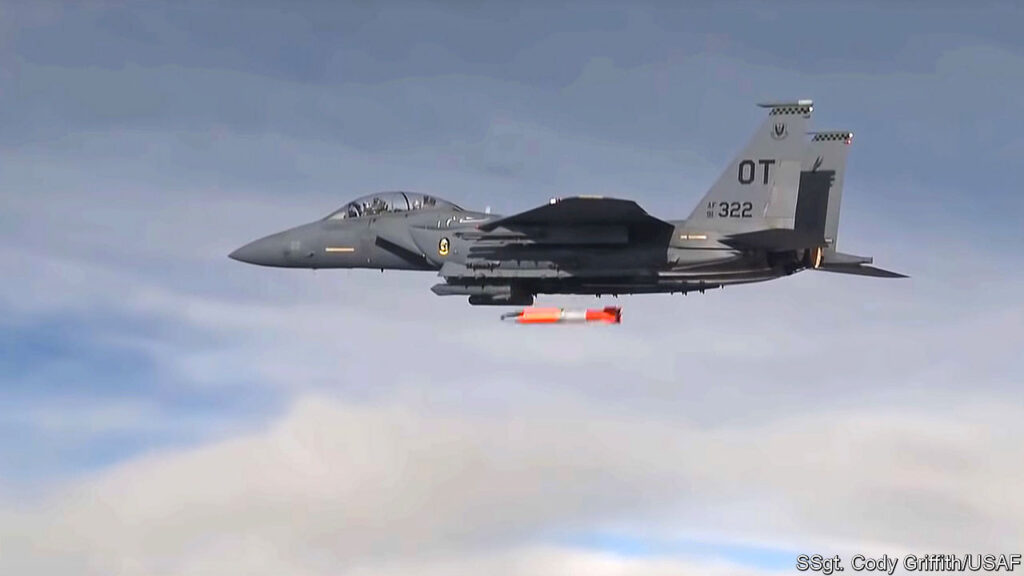Turkey GAZAP and NEB-2 bombs successfully tested in a major defense breakthrough. These 970 kg ghost bombs can be deployed from F-16 fighter jets.
Turkey has conducted successful tests of its most advanced GAZAP and NEB-2 ghost bombs. On July 26-27, during the 17th International Defense Industry Fair (IDEF) 2025 held in Istanbul, Turkey showcased the test footage of these bombs.
Each bomb weighs 970 kilograms (around 2,000 pounds) and has been developed by the research and development center of Turkey’s Ministry of Defense. The GAZAP features a thermobaric warhead. These bombs can be deployed from F-16 fighter jets.
The video footage demonstrates that the bomb has the capability to impact an area of several hundred square meters. It comprises 10,000 specialized particles, which disperse at a rate of 10.6 particles per square meter following detonation. According to Turkey’s Ministry of Defense, testing for both bombs has been completed, and they are now prepared for operational use.
Turkey has successfully conducted tests of its most potent GAZAP and NEB-2 ghost bombs. The testing video of these bombs was released by Turkey on July 26-27 during the 17th International Defense Industry Fair (IDEF) 2025, which took place in Istanbul.

Each bomb weighs 970 kilograms (around 2,000 pounds) and has been developed by the research and development (R&D) center of Turkey’s Ministry of Defense. This move signifies Turkey’s increasing focus on self-sufficiency within the defense sector.
In recent decades, Turkey has swiftly advanced its military technology. The country is now striving for self-sufficiency in defense capabilities.
Turkey’s defense policy aims to lessen reliance on foreign suppliers while encouraging the production of local products. To achieve this, Turkey has made significant progress in areas such as missiles, armored vehicles, naval vessels, and aircraft.
Turkey’s arsenal includes several missiles, such as the Typhoon, Siper, and Sapan. The Typhoon Block-4 stands out as Turkey’s first hypersonic ballistic missile, boasting a range of 800 km and exceeding speeds of Mach 5. It has a weight of 2,300 kilograms and measures 6.5 meters in length.

The impact of Turkey’s bomb testing on India…
The relationship between India and Turkey has been intricate and multi-faceted, encompassing historical, cultural, and diplomatic dimensions. While there exists trade and cultural exchange between the nations, tensions have arisen due to various issues, particularly Turkey’s support for Pakistan and its position on Kashmir.
Nevertheless, India provided assistance to Turkey following the catastrophic 7.8 magnitude earthquake that hit Turkey and Syria on February 6, 2023. This humanitarian effort was termed Operation Dost and showcased India’s commitment during the crisis, which Turkey acknowledged with gratitude.
The special bond between Turkey and Pakistan
Turkey and Pakistan share strong military and diplomatic ties. In the past, Turkey has supplied Pakistan with various weapons, including Bayraktar TB2 drones and MİLGEM corvette warships. An example of this is the PNS Babar.
Should Turkey decide to share or export these bombs (GAZAP and NEB-2) to Pakistan, it could significantly bolster Pakistan’s military capabilities.

The Turkish warship arrived in Pakistan amid ongoing India-Pakistan tensions.
In May, the Turkish Navy’s warship TCG Buyukada (F-512) docked at Karachi’s port along with its entire fleet during the India-Pakistan conflict. However, the Pakistani Navy characterized it as a goodwill visit.
According to the Pakistani military, the objective of this port visit was to enhance maritime collaboration between the two nations. Turkey also referred to this as a move to strengthen coordination.
The arrival of the Turkish warship in Karachi coincided with heightened alert status for Indian forces following the Pahalgam terrorist attack. TCG Buyukada made its arrival in Karachi following discussions in which Turkey’s ambassador, Dr. Irfan Neziroglu, expressed solidarity with Pakistan’s Prime Minister, Shehbaz Sharif. GAZAP is equipped with a thermobaric warhead and is deployable from F-16 fighter jets.
The footage demonstrates that this bomb has the potential to impact an area spanning hundreds of square meters. It contains 10,000 specialized particles that disperse at a density of 10.6 particles per square meter post-explosion. Turkey’s Ministry of Defense announced that all testing for both bombs has concluded, and they are now operational.Turkey GAZAP and NEB-2 bombs successfully tested in a major defense breakthrough. These 970 kg ghost bombs can be deployed from F-16 fighter jets.
Turkey has conducted successful tests of its most advanced GAZAP and NEB-2 ghost bombs. On July 26-27, during the 17th International Defense Industry Fair (IDEF) 2025 held in Istanbul, Turkey showcased the test footage of these bombs.
Each bomb weighs 970 kilograms (around 2,000 pounds) and has been developed by the research and development center of Turkey’s Ministry of Defense. The GAZAP features a thermobaric warhead. These bombs can be deployed from F-16 fighter jets.
The video footage demonstrates that the bomb has the capability to impact an area of several hundred square meters. It comprises 10,000 specialized particles, which disperse at a rate of 10.6 particles per square meter following detonation. According to Turkey’s Ministry of Defense, testing for both bombs has been completed, and they are now prepared for operational use.
Turkey has successfully conducted tests of its most potent GAZAP and NEB-2 ghost bombs. The testing video of these bombs was released by Turkey on July 26-27 during the 17th International Defense Industry Fair (IDEF) 2025, which took place in Istanbul.
Each bomb weighs 970 kilograms (around 2,000 pounds) and has been developed by the research and development (R&D) center of Turkey’s Ministry of Defense. This move signifies Turkey’s increasing focus on self-sufficiency within the defense sector.
In recent decades, Turkey has swiftly advanced its military technology. The country is now striving for self-sufficiency in defense capabilities.
Turkey’s defense policy aims to lessen reliance on foreign suppliers while encouraging the production of local products. To achieve this, Turkey has made significant progress in areas such as missiles, armored vehicles, naval vessels, and aircraft.
Turkey’s arsenal includes several missiles, such as the Typhoon, Siper, and Sapan. The Typhoon Block-4 stands out as Turkey’s first hypersonic ballistic missile, boasting a range of 800 km and exceeding speeds of Mach 5. It has a weight of 2,300 kilograms and measures 6.5 meters in length.
The impact of Turkey’s bomb testing on India…
The relationship between India and Turkey has been intricate and multi-faceted, encompassing historical, cultural, and diplomatic dimensions. While there exists trade and cultural exchange between the nations, tensions have arisen due to various issues, particularly Turkey’s support for Pakistan and its position on Kashmir.
Nevertheless, India provided assistance to Turkey following the catastrophic 7.8 magnitude earthquake that hit Turkey and Syria on February 6, 2023. This humanitarian effort was termed Operation Dost and showcased India’s commitment during the crisis, which Turkey acknowledged with gratitude.
The special bond between Turkey and Pakistan
Turkey and Pakistan share strong military and diplomatic ties. In the past, Turkey has supplied Pakistan with various weapons, including Bayraktar TB2 drones and MİLGEM corvette warships. An example of this is the PNS Babar.
Should Turkey decide to share or export these bombs (GAZAP and NEB-2) to Pakistan, it could significantly bolster Pakistan’s military capabilities.
The Turkish warship arrived in Pakistan amid ongoing India-Pakistan tensions.
In May, the Turkish Navy’s warship TCG Buyukada (F-512) docked at Karachi’s port along with its entire fleet during the India-Pakistan conflict. However, the Pakistani Navy characterized it as a goodwill visit.
According to the Pakistani military, the objective of this port visit was to enhance maritime collaboration between the two nations. Turkey also referred to this as a move to strengthen coordination.
The arrival of the Turkish warship in Karachi coincided with heightened alert status for Indian forces following the Pahalgam terrorist attack. TCG Buyukada made its arrival in Karachi following discussions in which Turkey’s ambassador, Dr. Irfan Neziroglu, expressed solidarity with Pakistan’s Prime Minister, Shehbaz Sharif. GAZAP is equipped with a thermobaric warhead and is deployable from F-16 fighter jets.
The footage demonstrates that this bomb has the potential to impact an area spanning hundreds of square meters. It contains 10,000 specialized particles that disperse at a density of 10.6 particles per square meter post-explosion. Turkey’s Ministry of Defense announced that all testing for both bombs has concluded, and they are now operational.





